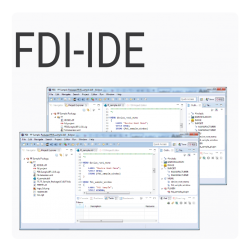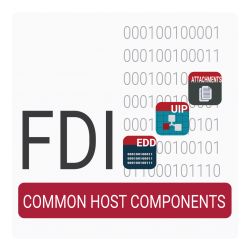FDI EXPLAINED
FDI technology has been developed and supported by the automation industry’s leading technology foundations and suppliers. With FDI the advantages of FDT® are combined with those of EDDL in a single, scalable solution. FDI takes account of the various tasks over the entire lifecycle for both simple and the most complex devices, including configuration, commissioning, diagnosis and calibration, data access for monitoring and optimization through OPC UA.
An FDI Enabled solution requires two components. A host system that supports FDI, and instrumentation that includes support for FDI Packages. An FDI Package is a collection of files including:
- An Electronic Device Description (EDD) based on IEC 61804
- An optional user interface plug-in (UIP) based on HTML5/JavaScript or Microsoft Windows(R) Presentation Foundation (WPF)
- Instrument documentation files and communication technology specific files
FDI Enabled host systems can be found in a range of automation products including device management software as part of a process control or asset management system, a laptop based device configuration tool, a hand held field communicator or gateways for monitoring and optimization. The FDI architecture requires a set of common host software components:
- The EDD Engine - a multiprotocol EDDL interpreter
- The UI Engine - provides rendering and hosting services for instrumentation user interfaces
- PA-DIM server - enables access to a standardized set of device information
FIeldComm Group supplies the following products and a training workshop that are designed to allow automation suppliers to accelerate development of FDI host systems:
The Benefits of FDI for End Users
FDI Technology offers numerous benefits to end users including:
- Certificate based security for FDI Device Packages
- A single device package for all host systems
- Next generation HTML5 user interface options
Visit our dedicated end user site for FDI Technology to learn more
FDI PACKAGE IDE (INTEGRATED DEVELOPMENT ENVIRONMENT)
The FDI Package IDE makes writing, running and testing of FDI Device Packages easier and more efficient by providing the complete tool chain you need for FOUNDATION Fieldbus, HART, PROFIBUS and PROFINET, Ethernet IP, OPC UA and Modbus devices in one application.
The IDE supports EDD editing and tokenizing into one encoded file format. The encoded EDD, the UIP (developed using HTML5 and JavaScript or Microsoft .net technology) and the attachments are combined to form an FDI Package by the FDI Package IDE. The Reference Runtime Environment runs the FDI Packages for test and debugging. It also maps device information into the PA-DIM server. The Device Package Test Tool performs automated conformance testing of FDI Packages.
The FDI Packages that a device manufacturer creates in this manner are registered by FieldComm Group and PROFIBUS & PROFINET International, together with the respective device hardware.
THE FDI PACKAGE IDE INSTALLER INCLUDES THE FOLLOWING COMPONENTS:
- IDE Plugin for Eclipse
- Individually licensable for:
- HART
- FOUNDATION Fieldbus
- PROFIBUS and PROFINET
- Other protocols like Ethernet IP, Modbus, OPC UA
- Example projects for all supported communication protocols.
- Automated FDI Device Package Test Tool
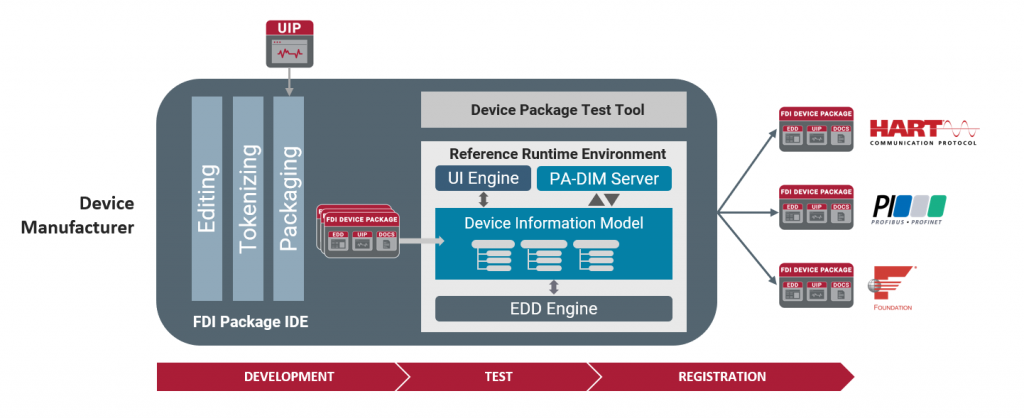
- Reference Run-time Environment - Built on the FDI Common Host Components including the EDD Engine, UI Engine and PA-DIM server
- Communication servers for the supported protocols
- OPC UA communication server interface for 3rd party communication servers
- User Manual and Product Documentation
HOST ARCHITECTURE
The FDI host architecture is based on the information model used in the OPC Unified Architecture (OPC UA), which provides advantages such as platform independence. The FDI Server imports FDI Device Packages into its internal device catalog. As FDI Packages do not require registration in the sense of a software installation, there are no unpleasant side effects. The architecture supports hosts built around EDDL as well as FDT technology.
COMMON HOST COMPONENTS
The FDI Common Host Components - EDD Engine, UI Engine and PA-DIM Server - ensure that an FDI Device Package or an existing EDD behaves in the same way in various FDI host system architectures. The EDD Engine supports the entire EDDL scope in a multiprotocol manner for FF, HART, PROFIBUS and PROFINET and provides a generic approach for other protocols like Ethernet IP, Modbus, and OPC UA. It is backward compatible with existing EDDL binary formats for FF (ff4, ff5) and HART (fm8). The UI Engine is independent of communication protocols. It generates the device specific user interfaces from a device description and hosts the User Interface plug-ins. This means that system manufacturers no longer need to integrate protocol specific interpreter components, but only one. This saves time and effort, and aims to contribute to improving the quality and interoperability of host systems.
The FDI host architecture is based on the information model used in the OPC Unified Architecture (OPC UA), which provides advantages such as platform independence. The FDI Server imports FDI Device Packages into its internal device catalog. As FDI Packages do not require registration in the sense of a software installation, there are no unpleasant side effects.
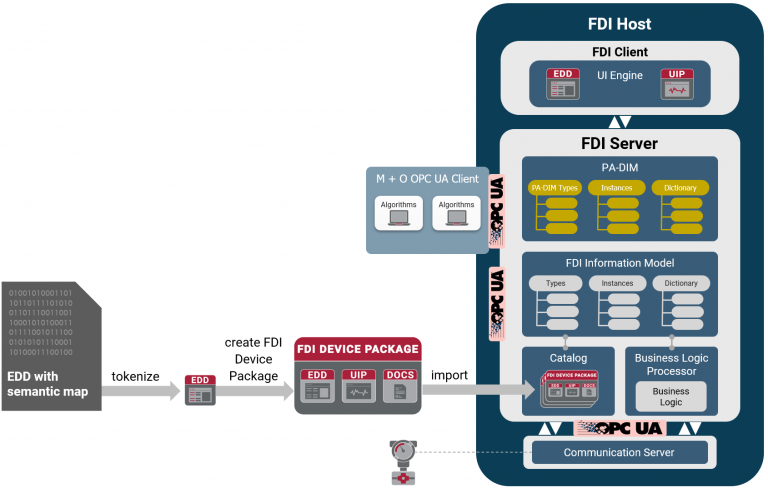
The representation of device instances in the FDI Server takes place in the information model. The information model maps the communication topology of the automation system by representing the entire communication infrastructure and the field devices as objects. This is also where the data, functions and user interfaces of the devices are stored. FDI Clients access the information model. By interpreting the EDD in its EDD Engine the FDI Server always ensures that the device data remain consistent.
The multiprotocol EDD Engine is backward compatible with existing EDD formats HART fm8 and FF ff4 and ff5. Existing EDDs can therefore be processed directly in an FDI host.
In the FDT-based architecture, the FDI Host is implemented in a DTM which functions like a gateway between FDI and FDT technologies. From the viewpoint of the FDI Package, the FDI DTM acts like an FDI host; for FDT framework applications, it acts as a DTM. For many FDT Frame manufacturers, this opens up an economically attractive migration route to FDI. With this solution device vendors only provide device packages only which can be used in native FDI based systes as well as in FDT based systems.
Also for implementing the FDI DTM the FDI Common Host Components are used to ensure interoperability. The backward compatibility of the EDD Engine enables execution of existing EDD formats HART fm8 and FF ff4 and ff5.
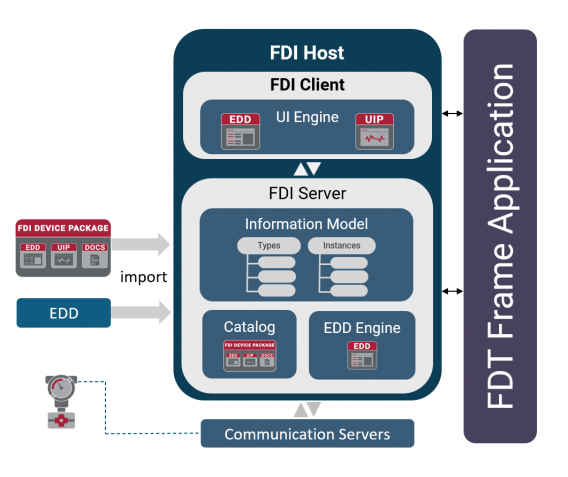
Additional Resources
Check out these resources, including brochures, technical papers and other documents.
